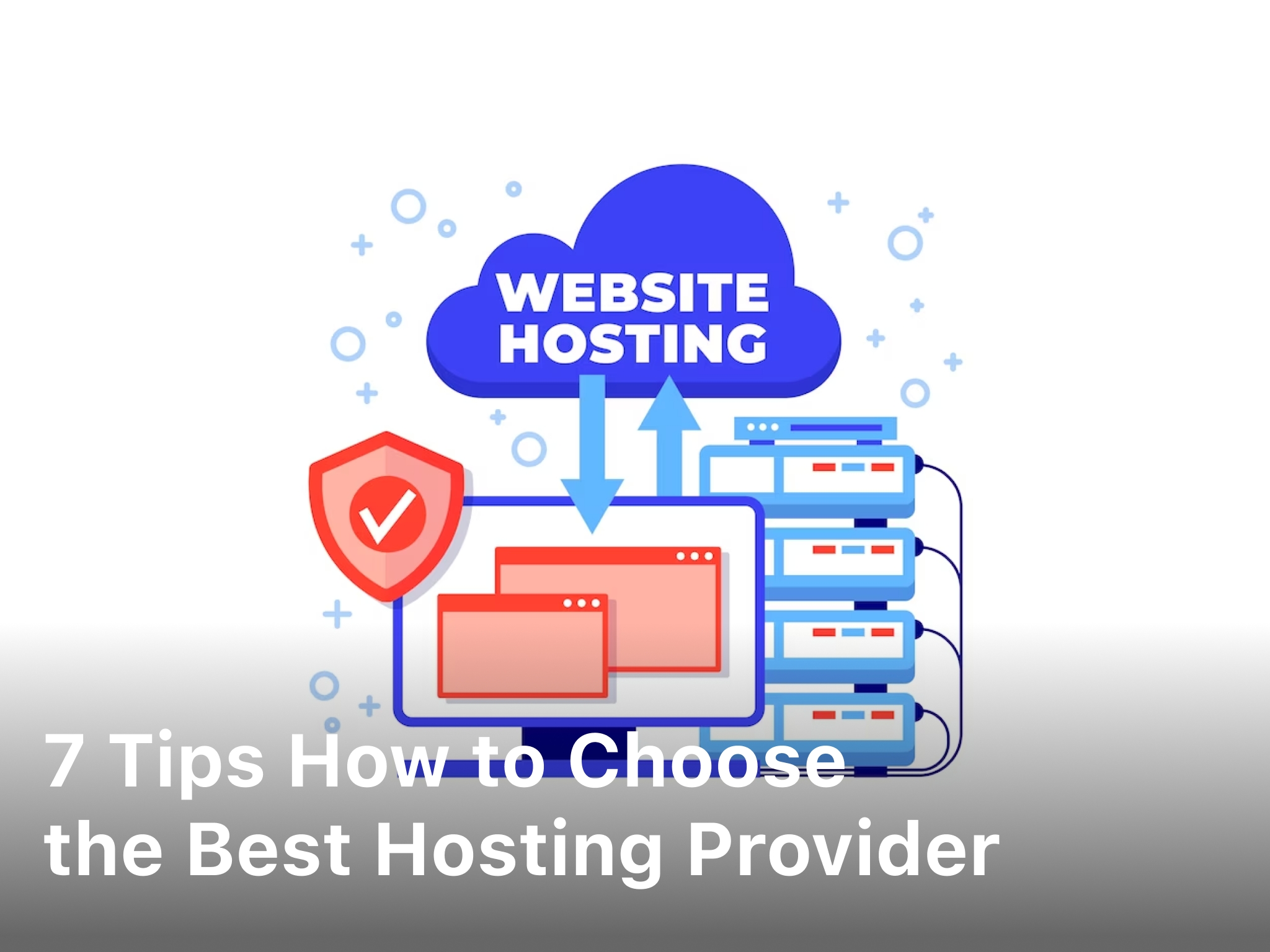7 Tips How to Choose the Best Hosting Provider

As a business owner, having a website is essential to establish your online presence. However, finding a reliable web hosting provider that fits your needs and budget can be challenging with so many options to choose from. When selecting a web host, there are several factors you should consider to ensure you make the best choice for your business. In this article, you will discover seven tips to help you evaluate web hosting providers and choose the one that is the optimal solution for your website. By following these recommendations, you can avoid common mistakes and find a web host that provides the performance, security, and support your business deserves. With the right web hosting partner, you will have the foundation you need to build a website that impresses your visitors and supports your business goals.
Determine Your Hosting Needs
Looking how to choose the best hosting provider? that meets your needs, first determine what those needs are. Ask yourself the following questions:
- What type of website am I building? A blog, ecommerce store, or business website will have different hosting requirements than a personal portfolio site.
- How much traffic do I expect? If you anticipate a high volume of visitors, you’ll want a hosting plan that can accommodate that and provide fast loading speeds. For most small businesses and personal sites, shared hosting should work fine.
- What features do I need? Things like email, security, storage space, and site backups are important to consider. Make sure any hosting provider you’re evaluating offers the essential features for your site.
- What is my budget? Hosting plans vary widely in price. Determine how much you can afford to spend each month and find options in that range. Some good, budget-friendly hosts offer plans for under $10/month to start.
- How technical am I? If you’re not very tech-savvy, look for a host that provides simple setup and an easy-to-use control panel, as well as good customer support. More advanced users may want greater control and customization options.
By thoughtfully assessing your needs and priorities upfront, you can find a hosting provider tailored to your requirements. Take advantage of any free trials to test different hosts and check that they meet your needs before committing to a long-term plan. With the variety of options available today, there’s a perfect hosting solution out there for your website.
Check the Hosting Features
When choosing a hosting provider, evaluating the features they offer is key to determining if they meet your needs. Some important aspects to consider include:
- Disk space and bandwidth: Make sure the provider offers enough storage space and data transfer for your site. For most small to medium sites, 10-50GB of disk space and 100-500GB of bandwidth per month should suffice.
- Control panel and tools: Look for a user-friendly control panel to easily manage your account, domains, files, databases, emails, security, and more. Tools like website builders, ecommerce platforms, content management systems, and analytics are a plus.
- Reliability and uptime: Select a hosting company that guarantees a high uptime, preferably 99% or more. This means your site will be accessible and working properly almost all of the time. Check reviews to confirm the provider’s reliability and customer service.
- Email accounts: If you need business email addresses associated with your domain, choose a host that provides email services and enough email accounts for your needs. IMAP or POP3 access and spam filtering are useful features.
- Scalability: As your site grows, you’ll want a hosting plan that can scale with it. Look for a provider that offers easy upgrades to more robust shared hosting plans or dedicated servers. Some even provide a seamless transition from shared to VPS to dedicated hosting.
- Security: Hosting companies should actively monitor for and protect against cyberthreats like malware, DDoS attacks, and data breaches. They should also keep software, servers, and other technologies up to date with the latest security patches. Review their security guarantees and protocols.
With the variety of hosting providers out there, analyzing their features will help determine which is the optimal choice for your website’s needs and long term success. Selecting a provider with the right tools, resources, and technical abilities is well worth the investment.
Related Article : Guide: How to Survive an Internet Shutdown
Evaluate Hosting Reliability and Performance
To choose a reliable hosting provider, you need to evaluate both their performance and reliability.
Uptime and Performance
A host’s uptime refers to the percentage of time their servers are operational. Look for a host that guarantees at least 99.9% uptime, which allows for minimal downtime. Check the host’s historical uptime to ensure they meet their claims.
Also consider the host’s page load speeds and server response times. Faster performance means better user experience for your website visitors. Look for a host with high-performance SSD storage, a large bandwidth allocation, and powerful server processors.
Data Redundancy and Backup
Find out if the host offers data redundancy, meaning they have multiple copies of your site’s files stored on separate servers in case of hardware failure. They should perform regular data backups in case of accidental deletion or corruption. Ask about the frequency and retention policy for backups.
Security and DDoS Protection
Choose a host that prioritizes security and provides resources to protect your site. Look for a host that offers DDoS protection, SSL certificates, strong firewalls, and two-factor authentication. They should disclose any past security breaches and discuss their response.
Customer Support
Pay attention to the level of customer support offered by the host. Look for 24/7 phone, email and live chat support so you can get help when you need it. Check reviews from their existing customers to determine the speed, knowledgeability and helpfulness of their support staff.
By evaluating these key factors, you can find a hosting provider you can rely on to deliver high performance, security, and support so you can focus on growing your business. The ideal host will safeguard your site and give you peace of mind.
Compare Hosting Plans and Pricing
When choosing a hosting provider, carefully compare their various hosting plans and pricing to determine what will suit your needs. Consider the following:
- Shared vs. Dedicated: Shared hosting means your site shares server resources with other sites. Dedicated hosting provides your site its own server. For most, shared hosting is sufficient and more budget-friendly. Dedicated hosting is better for large, high-traffic sites.
- Storage and Bandwidth: Make sure the plan offers adequate storage for your site files and enough bandwidth for your expected traffic. Most shared plans offer 10-50GB of storage and 100GB-1TB of bandwidth which is enough for a typical small business site.
- Email Accounts: If you need business email accounts, check how many are included and if more can be added. Some plans offer unlimited email while others charge per account.
- Control Panel and Features: Compare the control panel and any included features like website builders, ecommerce tools, content management systems, etc. Some are more robust and user-friendly than others.
- Reliability and Uptime: Choose a plan with a reliable, fast network and solid uptime guarantee, like 99.9%. Downtime means loss of access and revenue, so uptime is critical.
- Cost: Hosting plans can range from $3 to $50+ per month. Don’t assume higher cost means better service. Look at the overall value of what’s included for the price. Some budget hosts provide great service at lower cost.
- Contract Terms: Many hosts offer month-to-month or annual contracts. Annual contracts often come with a lower monthly rate but you’re committed for a year. Month-to-month provides more flexibility.
Comparing multiple hosting providers and plans in this way will help you find the right solution that balances your needs and budget. Choosing the best web host is a key step to building a professional online presence for your business. Selecting the right plan upfront will help ensure your site has room to grow and the options to meet your needs down the road.
Check Out Hosting Reviews and Ratings
To choose a reliable hosting provider, it’s important to do thorough research by reading reviews and ratings from independent third-parties.
Check Third-Party Reviews Sites
Websites like Trustpilot, HostAdvice, and HostingFacts provide unbiased reviews from actual customers. Look for hosts with mostly positive reviews mentioning things like:
- Reliability and uptime
- Helpful customer support
- Easy to use control panel
- Affordable and transparent pricing
Avoid hosts with reviews frequently citing issues with downtime, poor support, or hidden fees.
Read Expert Roundups and Comparisons
Established technology websites like CNET, PC Mag, and Wirecutter regularly review and compare web hosts. See which hosts they recommend as the best for things like:
- Shared hosting
- WordPress hosting
- VPS hosting
- Dedicated hosting
The hosts that repeatedly rank well across different categories and publications are usually a safe choice.
Check Social Ratings
On platforms like Facebook, Twitter, and Reddit, people will often discuss their experiences with various web hosts. Search for the names of hosts you’re interested in to see what kinds of ratings, reviews, and comments come up. Look for consistently positive feedback and high star ratings.
Consider Official Accreditations
Some hosting providers will highlight accreditations from organizations like the Better Business Bureau (BBB) to demonstrate their reputation and credibility. While not always definitive, a good rating and accreditation from the BBB can be a positive sign.
Doing thorough research by checking reviews, ratings, and recommendations from various independent sources is the best way to determine which web host is most likely to meet your needs and provide quality, reliable service. Comparing multiple options will help you find a host you can trust to power your website.
In conclusion, choosing the best hosting provider for your website is a crucial decision that can impact its performance and success. By considering factors such as reliability, speed, security, customer support, pricing, and scalability, you can make an informed choice. Remember to assess your specific needs and preferences, conduct thorough research, read reviews, and compare different providers before making a final decision. With careful consideration, you can find the hosting provider that aligns with your requirements and ensures a seamless online experience for your website visitors.




